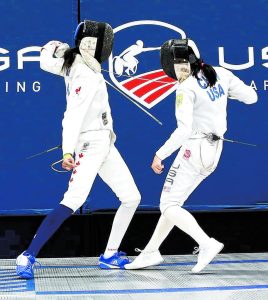 Isabella Chin knows a thing or two about discipline. The 17-year-old senior at Manhasset Secondary School has been fencing since she was in third grade. Her mom suggested fencing when the younger Chin had run through more standard sports like swimming and ice skating. For Chin, fencing clicked in a way she hadn’t experienced with her other activities.
Isabella Chin knows a thing or two about discipline. The 17-year-old senior at Manhasset Secondary School has been fencing since she was in third grade. Her mom suggested fencing when the younger Chin had run through more standard sports like swimming and ice skating. For Chin, fencing clicked in a way she hadn’t experienced with her other activities.
“I like many different components that go into fencing, like how strategy plays a big role. You have to be both mentally and physically in shape. And I also admire how you may be creative in your actions. I also feel like discipline is a big part of the sport and being confident. It teaches you that it’s important.” Chin said.
Chin competed in the Junior World Cup, the ultimate competition for fencers under 20 years old, in Maalot, Israel, in January. Only the twelve best fencers in the country earn spots to represent Team USA at the prestigious competition. Chin represented Team USA proudly and proved that she was the strongest fencer of the day, winning the Gold Medal and becoming a World Cup Champion.
Though Chin is no stranger to international competition, the World Cup still presented a unique challenge. “Every time I do (an international competition,) it always has a different feel to it compared to a domestic competition, because you’re fencing different competitors from different countries, and they all have different styles. When I went to Israel, it was tough. It was something I had to prepare myself for. But I thought it was a good experience, competing with people from different countries.”
Chin is trained in the épée discipline of fencing. This discipline uses the heaviest of the fencing swords, also called an épée. The tip of the epee is spring loaded and requires 750 grams of pressure to register a hit. According to the International Fencing Federation, the épée is a thrusting weapon and the attack is with the point only. In this discipline, the target area is the entire body, head to toe, including any clothing and equipment. Any hit that makes contact is counted. Hits are awarded based solely on whichever fencer makes a hit first.
It might seem like fencing is a male dominated sport, but in reality, women have been participating for many years. Competitive fencing was one of the first sports featured in the modern Olympics. Women’s foil fencing was added in 1924, and the epee style in 1996. While men and women do compete separately, in Chin’s training, “we practice with both boys and girls. I feel like there’s no separation. More and more girls are participating in it, which I feel is really good. There’s more and more every year.”
Chin practices four days a week at New York Fencing Academy in Port Washington. Her coach, Sergey Danilov, describes her as one of the hardest working students there. “Isabella is usually one of the first to show up in the gym, and she’s definitely the last one to leave the gym. So she’s a very hard worker. She would usually come earlier and do just a regular warmup. After that she spent some time on self-improvement, which means using some exercises to improve yourself such as work, target work, and after that she normally would have a lesson, a private lesson, with me. And after that, she joins the group class where she is training with other athletes. After the group class, she always stays for extra defense, more bouts or to do some target work.”
Michael Mokretsov, co-owner of the fencing academy, also praised Chin’s dedication. “Isabella is not just a great fencer, but also a great student at school, an amazing teammate, and simply a hardworking person. She spends numerous hours on her studies to remain an excellent student and countless hours perfecting her actions at the gym, and yet, she manages to remain social with her family and friends. If there is one person who deserves this result, it is Isabella. She always stays for extra practice in the gym to get better but never forgets to help her younger teammates at New York Fencing Academy to succeed as well.”
This hard work has paid dividends outside of fencing as well. Chin has been recruited to fence for Harvard next year. One of her teammates is an opponent she faced at the World Cup.
“There is no doubt that Harvard earned a great person,” Danilov said. “Our congratulations to Isabella Chin and the entire “village” which helped her get great results on and off the strip.”
Chin, for her part, is keeping her focus on the near future, and her next competition. She has several fencing events over the coming months. “Yeah, I’m gonna be at Harvard. But for now, I’m preparing for the junior zonal championships, also known as the Pan American championships, which is … March fourth to sixth. And after that, I’ll be training for summer nationals, which is, I think, the biggest competition for the year because it’s the last competition of the season. But after that, I’ll be preparing myself for Harvard fencing team.”
And as far as Olympic aspirations, Chin is leaving that far future undecided. “Oh, I haven’t decided yet, but I feel like if I have a chance to go, I’d definitely try to go.”































